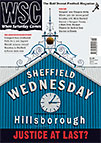 The long search for truth by the Hillsborough campaigners has been vindicated but, as Rob Hughes writers, time will tell whether they now get the justice they deserve
The long search for truth by the Hillsborough campaigners has been vindicated but, as Rob Hughes writers, time will tell whether they now get the justice they deserve
And so the wait is over. On September 12, some 23 years on, previously unseen government and police documents, in tandem with the Hillsborough Independent Panel’s report into the tragedy, were finally released to the public. The results were damning. As the families of the victims had insisted all along, Liverpool fans were found to be blameless for what happened on that horrifying afternoon in April 1989.
The report confirmed the suspicions of the Hillsborough Family Support Group (HFSG) – that senior police officers, officials and those in the emergency services had not only altered testimony to absolve themselves of any culpability for the deaths, but had actively sought to implicate innocent Liverpool fans instead.
A key element of the report’s findings was the fact that 41 of the 96 people who died in the crush “had the potential to survive”, had they only received treatment earlier. Which utterly undermined the verdicts of accidental death at the original inquests in 1990 and 1991. Speaking on BBC1’s Breakfast, Trevor Hicks of the HFSG, whose two daughters died that day, remarked that the findings showed that the whole affair was “much deeper and much dirtier than we ever thought possible”. HFSG chair Margaret Aspinall, who lost her son James at Hillsborough, declared: “I’m very grateful that the fans and the supporters have been exonerated as well as our dead. But most importantly we need accountability for the 96. We’ve got to demand that these verdicts are overturned.”
There were apologies from David Cameron, FA chairman David Bernstein and South Yorkshire Police Chief Constable David Crompton, who conceded that “on that day South Yorkshire Police failed the victims and families” and that “disgraceful lies were told which blamed the Liverpool fans for the disaster… These actions have caused untold pain and distress for over 23 years”. There was even a very belated one from Kelvin MacKenzie, the former Sun editor responsible for the appalling The Truth headline, which stated as fact that drunken Liverpool supporters had caused the disaster, pickpocketed the dead, assaulted police and urinated on bodies in the immediate aftermath. He fell some way short of admitting liability, claiming he was “totally misled” by copy handed to him by a reputable Sheffield news agency. “I published in good faith,” he offered, somewhat desperately, “and I am sorry that it was so wrong.”
The mood of vindication among friends, families and Liverpool fans was in marked contrast to that of a BBC documentary aired three days earlier. Hillsborough: Searching For The Truth was an often moving account of the families’ exhaustive quest for justice in the face of years of misinformation, cover-ups and shoddy officialdom. Aspinall, who recalled being taken to Sheffield Wednesday’s makeshift morgue that April weekend and being refused permission to take her son’s body home, insisted that the quest for justice was not about vengeance. It was about truth and accountability.
Liverpool fan Dave Kirby, a Hillsborough survivor, was still apoplectic at the Sun headline that followed in the days after. “That was our hour of need,” he said. “We had our arms open, looking for compassion and they came up with that despicable, obscene, rancid lie.” The film’s coup-of-sorts was an interview with Harry Arnold, the ex-Sun reporter who wrote the original piece, breaking his long silence on the issue. His comments seemed more like a pitiful attempt to deflect blame, or to absolve himself of any festering guilt, than ones founded in reasonable argument. When he saw that headline, he said: “I was aghast, because that wasn’t what I’d written. I’d never used the words ‘The Truth’…I’d merely written, I hoped and I still believe, in a balanced and fair way.”
One of the more emotive interviewees was former South Yorkshire policeman John Wilson. Clearly still affected by events that day, and having undergone extensive counselling since, he described being allotted the task of moving dead bodies from the terraces as other colleagues simply behaved like “rabbits in the headlights”. It concluded with him rather ambitiously hoping for some kind of reconciliation between the police and the victims’ families. Above all, the documentary proved that Hillsborough still carries an unimaginable depth of sorrow, pain and anger.
As a Liverpool fan, the events of these past weeks have brought a variety of emotions, from relief and a sense of muted satisfaction to sadness and frustration. And with it a palpable approximation of how a fair portion of the footballing community – and by extension the nation itself – judges Liverpool and its supporters. With the official Hillsborough verdict finally in, certain sections of society and the media have now shown their past actions to be less than gracious in a way that goes beyond mere tribal club loyalties. But that’s a whole other issue.
Now it’s on to the next stage of the Hillsborough fight. Will there really be prosecutions? Will those responsible finally be brought to account in the law courts? The wait might be over, but it remains to be seen whether true justice will prevail.
From WSC 309 November 2012